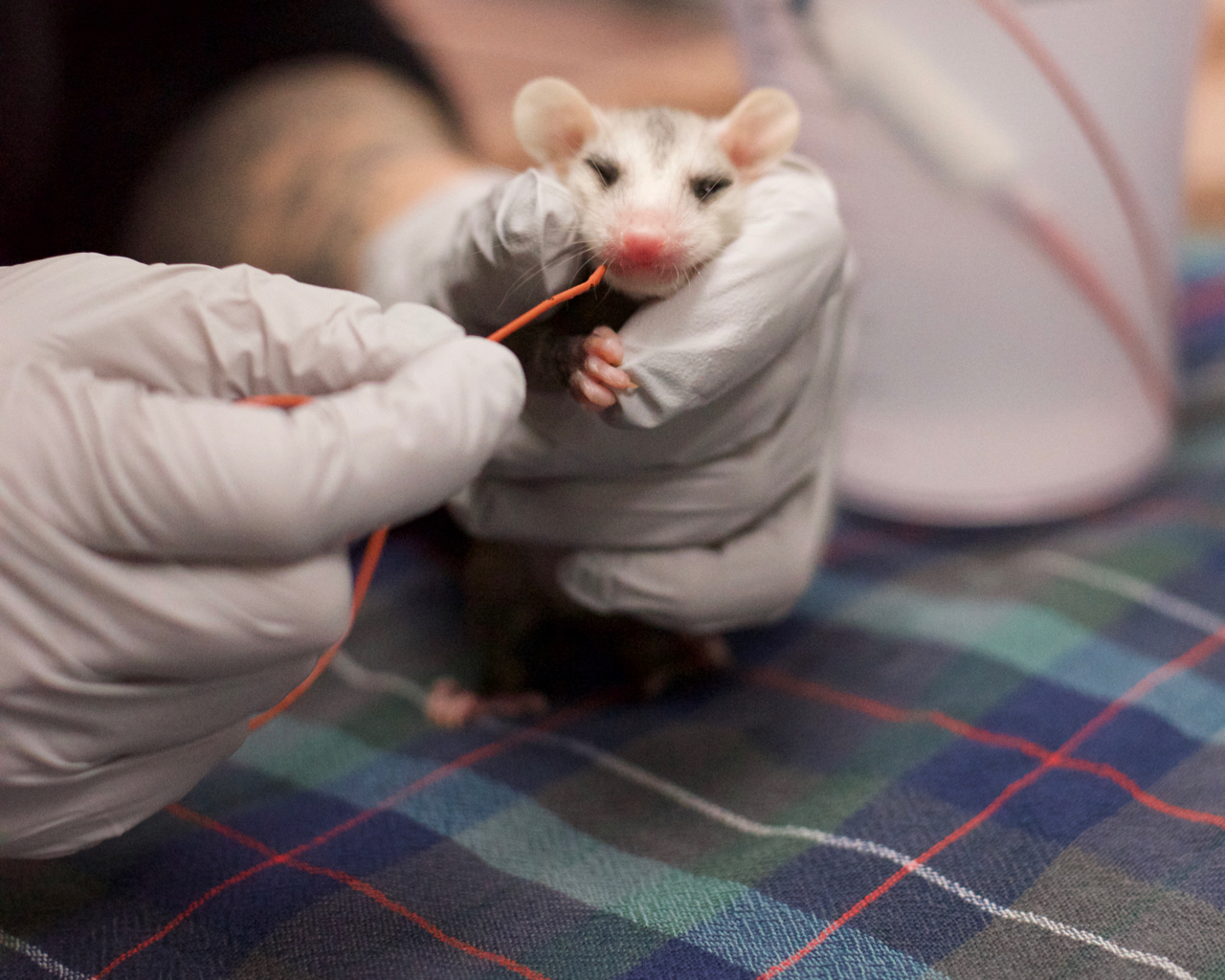
Every Spring and Summer, Humboldt Wildlife Care Center treats as many as 90 orphaned Opossums (Didelphis virginiana). We usually begin to admit them in mid-April – just around the corner! Nearly all of these young marsupials are brought to us after being found in the pouch of their mother, who’d been hit by a car. The second biggest human threat Opossums and their babies face that we see is being attacked by the family dog.

There are people who run Opossums down on the road on purpose. Who hasn’t heard some yahoo bragging about this very fact. Who hasn’t heard an endless array of roadkill jokes, complete with point systems for keeping score? In fact, both informal and rigorous studies have demonstrated that somewhere between 3 and 6 per cent of drivers will swerve to intentionally hit an animal on the side of the road. The number of animals who are killed intentionally when no swerving is required remains unstudied.

Now, the simple act of driving puts all of us at risk of unintentionally colliding with others, other cars, pedestrians, wild neighbors, family dogs and house cats. It is very distressing to unintentionally kill with our cars and most of us have probably done so, and we can all commiserate together.
Still, it seems obvious that many of the Opossums who are hit by vehicles, since they are large and easily seen in headlights (their name, “Opossum”, is an Algonquin word, purported to mean “white animal” or “white dog”), are hit intentionally.

Opossums, according to the internet, are very useful animals. That they eat a large number of ticks seems to be the chief reason to let them be… That a fellow traveler on this one green and blue Earth needs to have utility to human civilization in order that they be spared the worst our kind has to offer is perhaps the real lesson in that strategy of advocacy.
Intentionally running down Opossums may be hard to stop through education. Is it really simple, curable ignorance that would cause a person to act with such wanton destructiveness? Seems unlikely.

That makes it incumbent on us to find ways to protect Opossums where we can. Road designs that prevent small animals from entering the roadway and offer crossing sites that are easy and natural to use are a great idea, but expensive to implement everywhere that they’re needed. Being extra-vigilant and remembering that in a region like ours, with many rural highways following streams and criss-crossing the bottoms, wild neighbors are likely to be seen – to expect to see wild animals and be prepared to give them safe passage.
Also, we need to remember that wild neighbors have a right to move freely through the terrain, without being confronted by dogs. Supervising our family dogs’ night-time potty excursions is our responsibility.
An Opossum has quite the weaponry on board in the event of such a confrontation. First, they can hiss and show teeth. Opossums have a lot of pointy teeth. Second, if that doesn’t work, they can pretend to be dead and allow a foul smelling secretion to ooze from their rectum. Deadly.
In other words, Opossums present absolutely no threat to human households, other than the occasional ocurrence of an Opossum coming in through the cat door for some cat food.
And finally, when all else fails, if you find an Opossum who has been attacked by dogs, or hit by a car, even if apparently dead, check to see if she is a mother with live babies in her pouch. At least we can give these little ones a second chance.
Opossums have been a part of North America for a very long time – they have a right to be here. They exist from sea to sea, their range limited only by snow and winter cold.

Each Opossum we raise, of the 80 or so we admit each year, costs a certain amount. Milk replacer formula, heating pads, solid food, housing rent, caregivers, all of it is provided by your generous support. Without your help, we would not be here. Without your help, none of our wild neighbors would get a second chance. With your help, we can prevent some of these injuries and the need for a second chance, and with your support we’ll be here when care is necessary.
Thank you for your love of our wild neighbors! Thank you helping us all co-exist peacefully.


